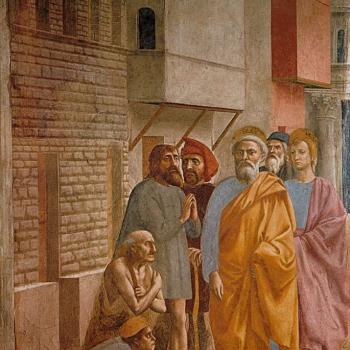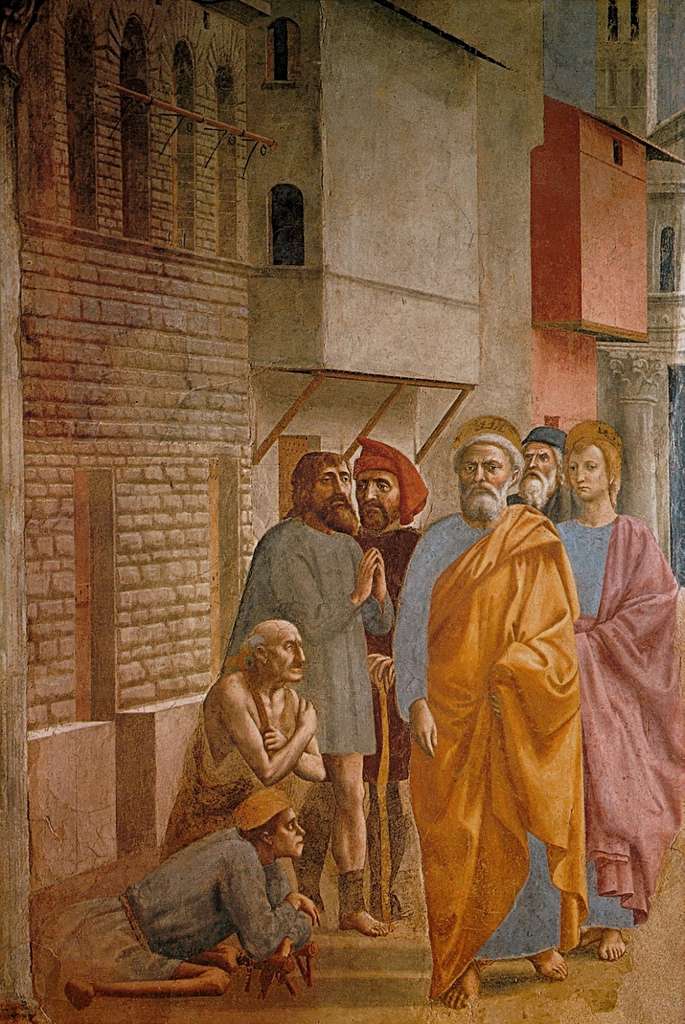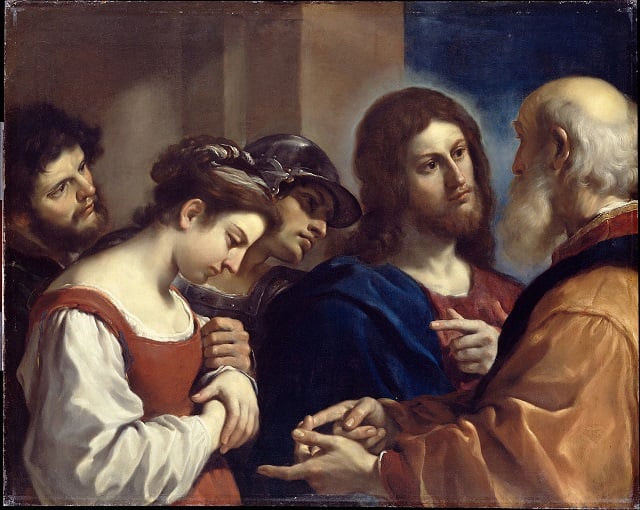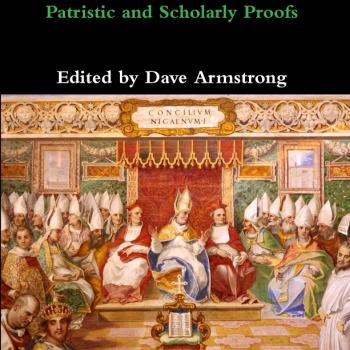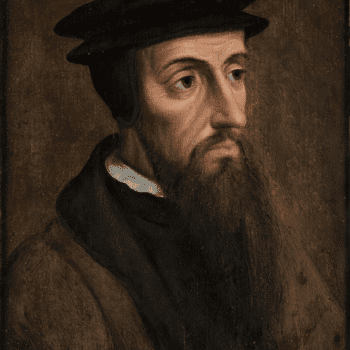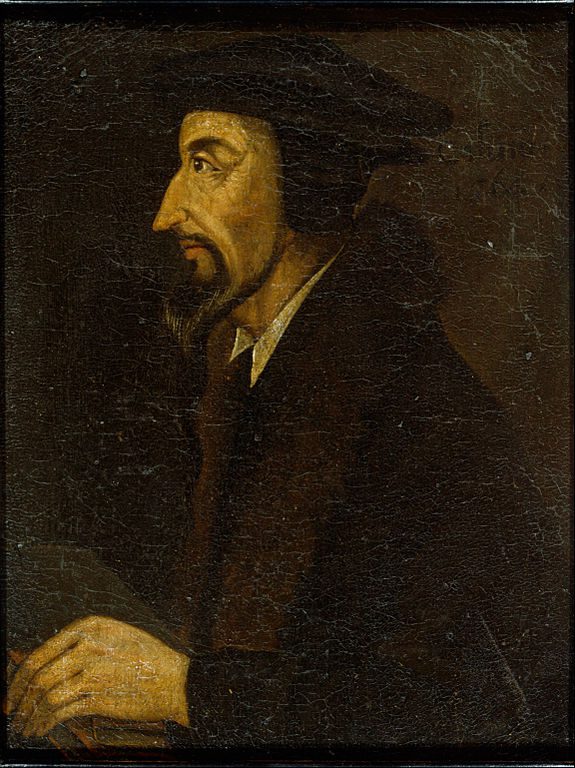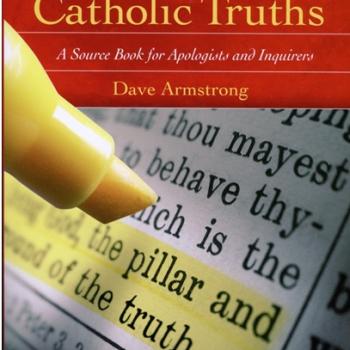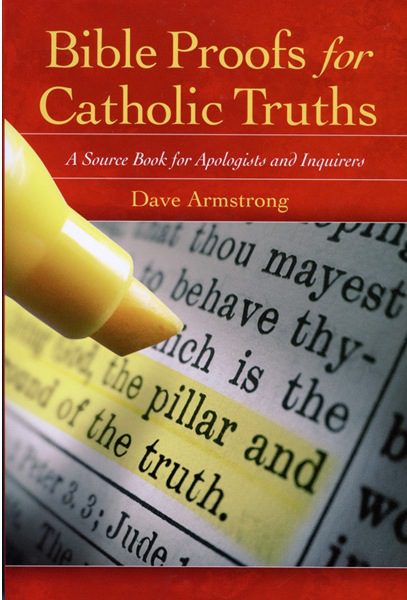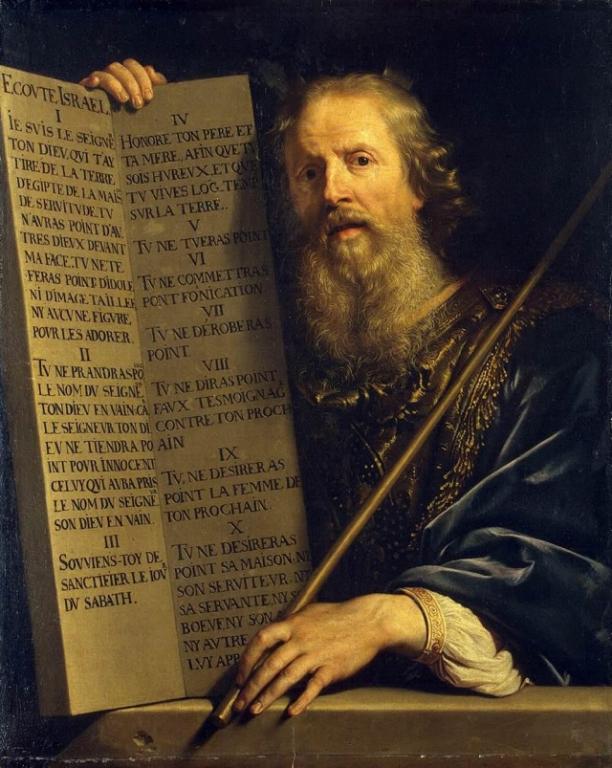
(5-5-05)
***
[see all the other installments of this multi-part debate on my James White web page: second section]
***
Mr. White’s words will be in blue; my former words in green.
***
One of Mr. White’s ongoing criticisms of my writing is that there is too much of it, and that I seek to overwhelm opponents by sheer tonnage of words. Hence, in our last exchange, he wrote, on 12-29-04:
Now, of course, DA will respond with text files (liberally salted with URL’s) that will average 10x the word count of anything I have to say. That’s OK. I shall . . . let him take home the bragging rights to verbosity and bandwidth usage.
Since he wanted to make this charge, I was determined to write less than his total words in my responses throughout. I did indeed do this, so that at the end of those multiple exchanges, the tally was as follows:
*
White: 7962 words / Armstrong: 5110 words (or 64% as many as White’s words, or White outwriting Armstrong by a 1.56 to one margin — roughly three words for every two that I wrote)
My percentage of words over against White’s, compared to his “average” prediction: 6.0% (5110 actual, compared to a predicted 79,620 / 16 times less)Following up on this objective measure of what is actually occurring in these discussions, I thought it would be interesting to see what the tallies were for the present topic. It’s even more lopsided this time. The section in my book, The Catholic Verses, which was devoted to White’s argument, was 2,259 words. White’s eight-part response was 8,249 words, or 3.65 times longer than what he was responding to (whereas my last total response was only 64% as long as White’s material to which I replied). My argument from my book was, then, 27% as lengthy as White’s reply to it.
If I follow White’s “outwrite the other guy” method, I would produce roughly 30,109 words in the upcoming installments. It’s highly unlikely, however, that I will need nearly that many in order to refute his argument. I just wanted to prove that White too often practices what he preaches against. That said, I won’t feel constrained to write less words than him (that point having been proven), but I certainly won’t write 3.65 times more than his words.
I shall now respond to White’s paper: The Catholic Verses: Matthew 23:1-3 (Part I) (1-22-05):
This will be my final installment in response to Dave Armstrong’s The Catholic Verses [italics added presently]. It is not that there are not many more passages that could be addressed, it is just that there is so very little actual exegesis in the book that the real essence of its self-enunciated claim to provide a defense of the Roman Catholic exegesis of the text of Scripture has already been refuted, repeatedly, and there is no reason to proverbially beat the dead horse.
As I pointed out many times in the earlier debates over my book (obviously to no avail, which is a rather annoying and frustrating characteristic of debates with White: he habitually ignores one’s clarifications and corrections, even of plain factual matters: this is virtually universally reported by Catholics who have debated him), the book is not, technically, about, or consisting of, exegesis per se. He has never grasped this. The fundamental purpose of the book is actually quite different. I explained in my Introduction:
I shall now proceed to offer a critique of common Protestant attempts to ignore, explain away, rationalize, wish away, over-polemicize, minimize, de-emphasize, evade clear consequences of, or special plead with regard to “the Catholic Verses”: ninety-five biblical passages that provide the foundation for Catholicism’s most distinctive doctrines. This is not a scholarly work, as I am no scholar in the first place, merely a lay Catholic apologist; but it is not “anti-scholarly,” and I will incorporate scholarship wherever necessary to substantiate the argument.
We see, then, what the purpose is. It is more of a logical critique of Protestant exegesis and particular tendencies and manifest biases in dealing with certain “Catholic-sounding” verses. It’s a somewhat subtle distinction, but a very important one, for our purposes. If White doesn’t even comprehend the fundamental nature and methodology of my book, then he can hardly offer a compelling refutation of any part of it with which he deals. One must first understand what one purports to refute. That’s rule number one in any debate, and I think White (as a frequent debater, who clearly prides himself on being very good at it) would readily agree with that general principle. I know what my own book is about (as the world’s greatest expert on my own book), and if White did also, then he would cease misrepresenting (inadvertently or not; I assume the former) what it was about.
He keeps harping on what he seems to think is the plain fact that I wouldn’t know how to do proper exegesis if my life depended on it. Well, that may or may not be true. Since I don’t claim to be a scholar who specializes in exegesis (or a scholar at all), and my arguments don’t depend on that fact, it is a rather moot point. The book is not a commentary. It is a reasoned critique of flaws in historic, mainstream orthodox Protestant commentary; especially those having to do with prior biases brought to the task of exegesis itself.
And one can do that — point out simple logical flaws and evasions — without having to be an expert on exegesis, or a Bible scholar (that would obviously help, but it’s not absolutely necessary for my particular purpose). One simple example will suffice in illustrating this point. I may not know the slightest thing about trigonometry or calculus. But if I, as an observer of a math professor, notice that there is a simple mathematical error in a complex equation or proof written out by the expert (say, 3 x 4 = 14), it is quite proper and not at all presumptuous for me to point that out, and “correct” the expert. I don’t have to know everything there is to know about trigonometry or calculus, or know as much as the expert knows, or even (in this instance) anything at all about it. All I have to know is that 3 x 4 = 12, not 14. Complex, systematic errors can be built upon the simplest of logical errors. And non-experts can point these out.
Likewise, when it comes to historic exegesis and commentary on Holy Scripture, I don’t have to be an expert on how to interpret such-and-such a Bible passage (with knowledge of Greek and Hebrew, and eight years of theology, New Testament, Old Testament, etc., etc.) in order to note that someone is ignoring a key aspect of it, or introducing extraneous concerns that have little to do with the verse, or using it to lodge yet another gratuitous and textually irrelevant “dig” at Rome, etc. I don’t need to be as brilliant as Calvin and Luther obviously were, in the neutral, non-polemical sense of loving and interpreting Scripture, and providing many true insights which we as Catholics would agree with. It simply doesn’t follow.
My book had to do with logical critiques and examinations of underlying assumptions which Protestants bring to the “table of exegesis,” and various techniques that are used to dismiss implications that are thought to be too “Catholic.” The book is filled with examples of this. It’s useless to present twenty of them. One would have to buy the book. But that is the methodology of it.
I think the central approach and thesis of the book is brilliant. I can say that because it wasn’t my initial idea at all. My publisher, Sophia Institute Press, came up with it, and asked me to write the book. I quickly “took” to the idea and became quite enthusiastic about it. It’s a unique approach and type of apologetic that no one else has yet tried, to my knowledge. But it’s not exegesis per se. It is about exegesis (meta-exegesis, if you will), not exegesis itself. It is much more about human bias, and the effect of prior theologies and predispositions upon exegesis, than about exegesis of texts (considered in isolation). In that way it is even somewhat of a psychological analysis, as it deals with our axioms and presuppositions, and how they affect our interpretations (sometimes leading to outright eisegesis). In any event, as long as White keeps falsely claiming that it is simply an exegetical work, he is grossly misrepresenting the book and making a massive straw man, which strikes me as quite odd, for one who is an author himself, of many books.
One would think that he could at least get the central purpose of the book right, before proceeding to critique it. But this ties into my point, too: White despises Catholicism as the purveyor of a “false gospel,” so in this instance he has distorted even the purpose and nature of a work which defends what he despises. His overwhelming bias disables him from providing a cogent critique. He feels he has to discredit the argument at all costs, even if he falsely portrays it (and myself) in so doing. This need not be deliberate (bias works quite well subconsciously), but it is a strong influence nonetheless, whether deliberate or not. Anti-Catholicism will do it’s dirty work, every time. And it becomes as easy as breathing, after years of practice.
White has issued endless remarks about how “ignorant” and clueless I am when it comes to the Bible (as we saw in my compilation of his potshots in the Introduction), so I thought it was important to deal with this misguided notion that he has, at some length, right at the beginning of my replies, so readers (especially those who haven’t read my book) will be under no delusions as to what my book is about; what it is actually dealing with, subject-wise.
For example, in the sections relevant to soteriology I would be more than happy for someone to compare the “exegesis” offered by Armstrong with the relevant sections of The God Who Justifies.
As the purposes were fundamentally different in both works (as explained above), the comparison would be completely irrelevant (and invalid). But several people have done Catholic counter-exegesis of soteriological verses, and White has simply ignored them. For example, Ben Douglass recently wrote an excellent paper along those lines, and White blew it off, on the grounds that Ben is a traditionalist (a variation of his timeworn theme that someone isn’t “important enough” to waste his valuable time on).
That has nothing to do with the merits of his exegetical argument. On the other hand, if White declines merely because Ben is in a category that he doesn’t like, and has had bad experiences with (which I could understand), then how is that different from my decision not to debate anti-Catholics (the present instance being excluded, under my “point-by-point loophole”)? Yet White has constantly chided me for my decision, implying that I am a coward, and that it is a rationalization. Very well, then, if I am a “coward”, then so is White, when he refuses to interact with someone who has done a great deal of work in an area where White claims to be an expert.
But I promised to address the one section Armstrong had sent to me prior to the publication of the book. He had even invited me to interact with him on the topic, but I declined, in light of the character of his presentation (which we will note below).
Yet I am mocked by White and taunted for generally declining to interact with anti-Catholics: the sort of people who have now constructed fake blogs, using my name, pretending to be me, in an attempt to claim that I am a completely-obsessed “narcissist” or “moron” or that I “hate” my theological opponents, etc. Eric Svendsen (a major anti-Catholic apologist and good friend of White’s) just called me a “lunatic” on his discussion board today. I’ve been called “filth” and “scum” and had my apologetics characterized as “foaming-at-the-mouth” and so forth. I’ve had people say I don’t have a “real job” because I am a Catholic apologist; real charitable stuff.
So (quite naturally and reasonably, I think) I decided that people who express themselves in those terms (including White himself, but to a considerably lesser extent than the bilge cited above) are not worth interacting with. But White sees that decision and claims that it is really motivated by my fear and inability, and the brilliance of my opponents’ arguments (even stating that my Lenten break this year was due to his unanswerable arguments!). It’s one of White’s many double standards. He can do the same thing I do, and that’s fine. He’ll condemn and make fun of my reasoning for doing the exact same thing that he does. He decides that certain people are unworthy to debate; so do I. But in this case, his opinion was unreasonable: Ben’s category of traditionalist or how well-known he might happen to be at present has nothing to do with his arguments. White has no problem debating Gerry Matatics, who is also a traditionalist (and quite a bit to the right of Ben Douglass).
I refer to his section on pp. 43-53 on Matthew 23 and “Moses’ Seat.” Like the section on Luke 1:28, clearly Armstrong is drawing from his many Internet articles, cobbling together the most serious attempt mounted in the work. If he does not succeed here, he truly succeeds nowhere in The Catholic Verses.
It’s true that I worked very hard on this section, because White’s argument provided me with plenty of opportunity to point out serious error. But if I were a reader, I wouldn’t put too much stock in White’s generalizations about my book, seeing that he doesn’t even understand its fundamental purpose.
Matthew 23:1-4 1 Then Jesus spoke to the crowds and to His disciples, 2 saying: “The scribes and the Pharisees have seated themselves in the chair of Moses; 3 therefore all that they tell you, do and observe, but do not do according to their deeds; for they say things and do not do them. 4 “They tie up heavy burdens and lay them on men’s shoulders, but they themselves are unwilling to move them with so much as a finger.
Here White cites some unknown version of the Bible (he doesn’t tell us, and I don’t feel like rummaging through my 30 or so versions to find out). I thought it might be either the NASB or the NIV, but it was neither. In my book, I cited verses 1-3, in the RSV Bible:
Matthew 23:1-3: “Then said Jesus to the crowds and to his disciples, ‘The scribes and the Pharisees sit on Moses’ seat; so practice and observe whatever they tell you, but not what they do; for they preach, but do not practice.’”
Here begins the longest sustained condemnation of the spirit and practice of Pharisaism in all of Scripture. Indeed, so strong, so compelling is the condemnation here that this passage was embarrassing to many Continental New Testament scholars in post World War II Europe. For most in less conservative circles this passage is considered a later polemic of the Christian church, reflecting a reality many decades removed from the ministry of Jesus. But in reality Matthew 23 “fits” perfectly right where it is. Its broad outlines have been seen throughout the Gospel in the conflict with the Jewish leadership, and it then forms the foundation of the judgment coming upon Jerusalem that appears in chapter 24. The section to which Mr. Armstrong refers begins a long litany of woes pronounced upon the hypocritical attitudes of the scribes and Pharisees. It is, in essence, the introduction to the blistering section that is Matthew 23.
I have no particular beef with this, other than to note that Jesus’ condemnations of the Pharisees were of a general nature (there were many corrupt Pharisees), not necessarily of the entire system of Pharisaism itself, considered apart from the behavioral and attitudinal corruptions of the time. Indeed, many aspects of early Christianity were adopted more-or-less wholesale from Pharisaical tradition (rather than from the Sadducees). But Christians of White’s general school and outlook, usually take a very dim view of the Pharisees altogether, and don’t acknowledge these historical and theological nuances. This is where the influx of Jewish scholarship into New Testament studies and exegesis in recent decades has been very helpful.
I had briefly commented on this passage in The Roman Catholic Controversy, and it is to the following that Armstrong responds in The Catholic Verses:
*****
The final passage we will examine presents the idea of “Moses’ seat.” Some modern Roman Catholics present this passage as substantiation of the idea of a source of extra-biblical authority receiving the blessing of the Lord Jesus. It has been alleged that the concept of “Moses’ seat” is in fact a refutation of sola scriptura, for not only is this concept not found in the Old Testament, but seemingly Jesus gives His approbation to this extra-Scriptural tradition. But is this sound exegesis? Is this passage being properly understood?
First, we note that the passage has spawned a plethora of differing understandings amongst scholars. But a few items immediately remove the Roman apologist’s interpretation and application from consideration. First, “Moses’ seat” refers to a seat in the front of the synagogue on which the teacher of the law sat while reading from the Scriptures. Synagogue worship, of course, came into being long after Moses’ day, so those who attempt to make this an “oral tradition” going back to Moses are engaging in wishful thinking. Beyond this, we are here only speaking of a position that existed at this time in the synagogue worship of the day. Are we truly to believe that this position was divine in origin, and hence binding upon all who would worship God? It certainly doesn’t seem that the New Testament Church understood it that way.
We first note interpreters such as Jeremias and Carson view this passage as engaging in biting irony. The Jewish leaders have presumed to sit in Moses’ seat, as suggested by Merx, Moulton, and Zahn, focusing on the use of the aorist tense of the verb “to sit.” They sat themselves in this place, but improperly. Such an understanding is certainly in line with the biting attack that follows immediately in the rest of the chapter.
But I am more prone to accept Gundry’s understanding, in which he rejects the satirical interpretation and instead notes,
So long as sitting in Moses’ seat qualifies the speaking of the scribes and Pharisees, “all things whatever” does not include their interpretative traditions, but emphasizes the totality of the law. “Therefore” establishes the qualification. They do keep their traditions. But they do not practice what they speak while sitting on Moses’ seat. Hence their traditions are not in view. Though elsewhere Matthew is concerned to criticize the scribes’ and Pharisees’ interpretations of the law, here he is concerned to stress the necessity of keeping the law itself. As usual, his eye is on antinomians in the church. (Robert Gundry, Matthew: A Commentary on His Literary and Theological Art (Grand Rapids: Eerdmans, 1982), pp. 454-455.)Indeed, the Lord’s unwillingness to become an “ecclesiastical rebel” is in perfect harmony with the Scriptural teaching on the subject of authority in the church. There was nothing in the tradition of having someone read from the Scriptures while sitting on Moses’ seat that was in conflict with the Scriptures, and hence, unlike the corban rule which we saw earlier in Matthew 15, Jesus does not reject this traditional aspect of Jewish synagogue worship. He does not insist upon anarchy in worship in the synagogue anymore than His apostle Paul would allow for it in the worship of the church at Corinth. It is quite proper to listen to and obey the words of the one who reads from the Law or the Prophets, for one is not hearing a man speaking in such a situation, but is listening to the very words of God. Indeed, when Ezra read the law to the people in Nehemiah chapter 8, the people listened attentively, and cried “Amen! Amen!” at the hearing of God’s Word. And who can forget the result of Josiah’s discovery of the book of the covenant in 2 Chronicles 34? It is proper to have men in positions of authority in the synagogue, just as in the Church. But Jesus points out that the listener is still to exercise a critical eye, for he is not to imitate the evil behavior of those who have been entrusted even with the sacred duty of leading the people of God in worship.
To leap from Jesus’ refusal to overthrow the form of synagogue worship that was present in His day to a wholesale endorsement of extra-scriptural, oral traditions is to make a leap of monumental proportions. And in light of the passages we have already examined that refute the need for such an extra-scriptural rule of faith, I suggest that the use of this passage by Roman apologists is in error.
*****
In our next section we will review Armstrong’s case on Matthew 23 and “Moses’ Seat.”
This is different from my copy of his book, dated 1996, so I assume that it is from a revision (or else White is cutting-and-pasting from a slightly different manuscript version of his own). In my copy, this (i.e., something similar to it) appears on pages 100-101. I’ve cited it in full in order to present his book remarks in their full context (and because I generally include all or almost all of my opponents’ words in dialogues, anyway). I won’t, however, respond at this point, since that is what I did in my book; I’ll wait till he makes his counter-argument, then I’ll cite my book as necessary.



